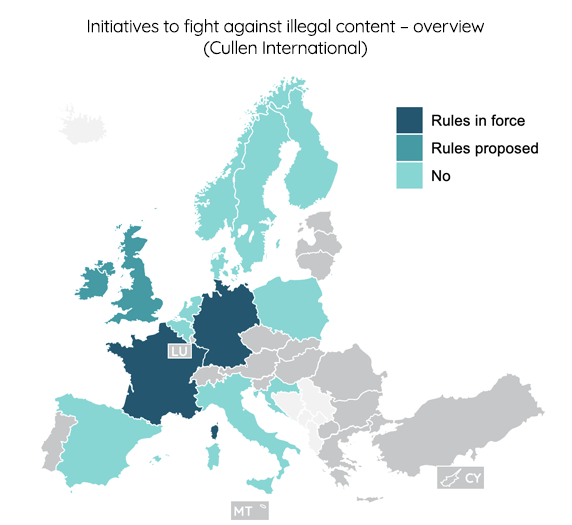Cullen International has just published a new benchmark with an overview of the countries which have adopted (or are in the process of adopting) legislation to fight against the dissemination of illegal content on social media/ online platforms.
In countries which have adopted (or are in the process of adopting) initiatives, the benchmark shows the type of illegal content covered and the type of platforms targeted (i.e. social media, search engines, etc.), the main obligations imposed on them, the sanctions foreseen in case of non-compliance and the special powers granted to the authority in charge of supervision (e.g. fines and blocking orders).
The research shows that four countries out of the 14 surveyed have rules in place (France, Germany), or are in the process of adopting rules (Ireland, UK) to fight against the dissemination of illegal content on platforms. In France and Germany, the rules cover certain types of illegal content as defined under the criminal code (and the legislation on the freedom of the press in France), whereas in the UK and in Ireland, the proposed legislation has a much wider scope as it covers many types of illegal and harmful content (such as pornography or content that can lead to eating disorders).

There is no general initiative to address illegal content in the other countries. In Italy, targeted initiatives exist to fight specific types of illegal content, such as cyberbullying and revenge porn. In Belgium (Wallonia), the regulator published an orientation note which underlines the impact of illicit content on online platforms and the inadequacy of the current regulation.
To access the full benchmark, please click on “Access the full content” - or on “Request Access”, in case you are not subscribed to our European Media service.
more news
08 May 25
Patchwork approach to 2G/3G switch-off poses challenge for IoT providers
Our IoT regulatory intelligence service provides a clear and comprehensive benchmark tracking the switch-off status of 2G and 3G networks in 66 countries across the world.
07 May 25
[INFOGRAPHIC] EU AI Act cheat sheet: general-purpose AI models
This cheat sheet by Cullen International provides a summary of the core provisions on general-purpose AI (GPAI) models under the EU AI Act.
05 May 25
National measures against spoofing practices in Europe
Cullen International’s research shows recent developments in national regulation against spoofing practices across Europe.